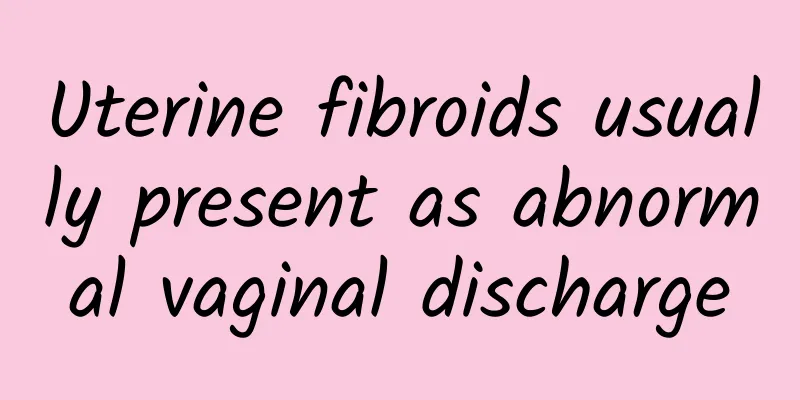Will ectopic pregnancy lead to spontaneous abortion? What are the treatments for ectopic pregnancy abortion?

|
Any pregnancy in which the fertilized egg implants anywhere other than the uterine cavity is collectively called an ectopic pregnancy, commonly known as an ectopic pregnancy. Depending on the location of implantation, there are fallopian tube pregnancy, ovarian pregnancy, abdominal pregnancy, cervical pregnancy and uterine rudimentary horn pregnancy. Among ectopic pregnancies, fallopian tube pregnancy is the most common. Will an ectopic pregnancy lead to spontaneous abortion? Will ectopic pregnancy lead to spontaneous abortion? Ectopic pregnancies mostly occur in the abdominal cavity and generally will not result in spontaneous abortion, but sometimes some symptoms of spontaneous abortion may appear. Patients with ectopic pregnancy should go to the hospital for examination and cooperate with treatment as soon as possible after experiencing such symptoms. Treatment of ectopic pregnancy abortion: 1. Drug treatment of ectopic pregnancy: The purpose of drug therapy is to preserve the fallopian tubes. The specific method is to use drugs to kill the embryo of ectopic pregnancy. Commonly used drugs are methotrexate and mifepristone. The former is safe and harmless and can be administered by intravenous or intramuscular injection. The latter is an abortion drug with a similar principle to artificial abortion. However, drug treatment of ectopic pregnancy is not suitable for all patients with ectopic pregnancy. First, the gestational sac must be small (less than 3.5 cm). Secondly, the patient's blood routine and liver and kidney functions must be normal. However, this method has two shortcomings. First, if the drug does not kill the embryo, it will cause the embryo to grow larger and larger, causing the fallopian tube to rupture and cause heavy bleeding. Or, if part of the embryo is killed while the other part survives, an old embryo will appear, causing infertility in women. 2. Surgical treatment of ectopic pregnancy: There are two surgical treatments for ectopic pregnancy: laparotomy and laparoscopy. Laparotomy is to directly remove the ectopic embryo after opening the abdomen. It can cure ectopic pregnancy at one time and preserve the fallopian tube, but it is easy to cause adhesion of pelvic organs after surgery, which will affect future fertility; laparoscopy is a minimally invasive surgery. It only requires puncturing a few small holes in the patient's navel and lower abdomen to complete the surgery. The operation method is roughly the same as laparotomy, and it can also be cured at one time. Its biggest advantage is that it has little trauma, fast recovery, is not easy to cause adhesion of pelvic organs, and has little impact on future fertility. However, it should be noted that surgery for ectopic pregnancy must be performed in a regular and professional hospital, because surgery for ectopic pregnancy not only has certain requirements for surgical facilities, but also has corresponding requirements for the doctors performing the surgery. |
Recommend
How to care after missed abortion
Speaking of missed abortion, many people may feel...
How to prevent uterine contractions and dysmenorrhea How to prevent uterine contractions and dysmenorrhea
How to prevent uterine contraction and dysmenorrh...
What are the early symptoms of cervical erosion in women? 3 early symptoms of cervical erosion that women must know
Cervical erosion is one of the manifestations of ...
Han Kuo-yu keeps his health regimen secret: warming feet, massaging abdomen... Chinese medicine: do this to get more points!
The election campaign is fierce. Candidates are r...
Can cervical inflammation be detected by B-ultrasound?
Cervical inflammation cannot usually be diagnosed...
How much does it cost to see a doctor for congenital absence of vagina?
Women with congenital absence of vagina hope to c...
Study: Excessive salt intake increases stomach cancer risk
The diverse and complex cooking methods of Taiwan...
What are the causes of adenomyosis?
How is adenomyosis caused? What is the cause? 1. ...
Can’t lose weight! 40% of Americans will be obese by 2030
Affected by the long-standing dietary culture and...
How much do you know about the symptoms of irregular menstruation
Irregular menstruation is a gynecological phenome...
The Legislative Yuan will hold an additional extraordinary meeting on the 20th to review the US beef case
Legislative Yuan Speaker Wang Jin-pyng convened g...
What are the symptoms of uterine fibroids? What are the dangers of uterine fibroids?
Symptoms of uterine fibroids: 1. Uterine bleeding...
What to do about early threatened miscarriage
What should we do if we have threatened abortion ...
5-pronged approach! The "LEARN" method for weight loss
Obesity is quickly becoming a national disease. T...
Can you rely on it to lose weight and eliminate edema? Red bean rice VS red bean water!
Obesity and edema have always been the nemesis of...









